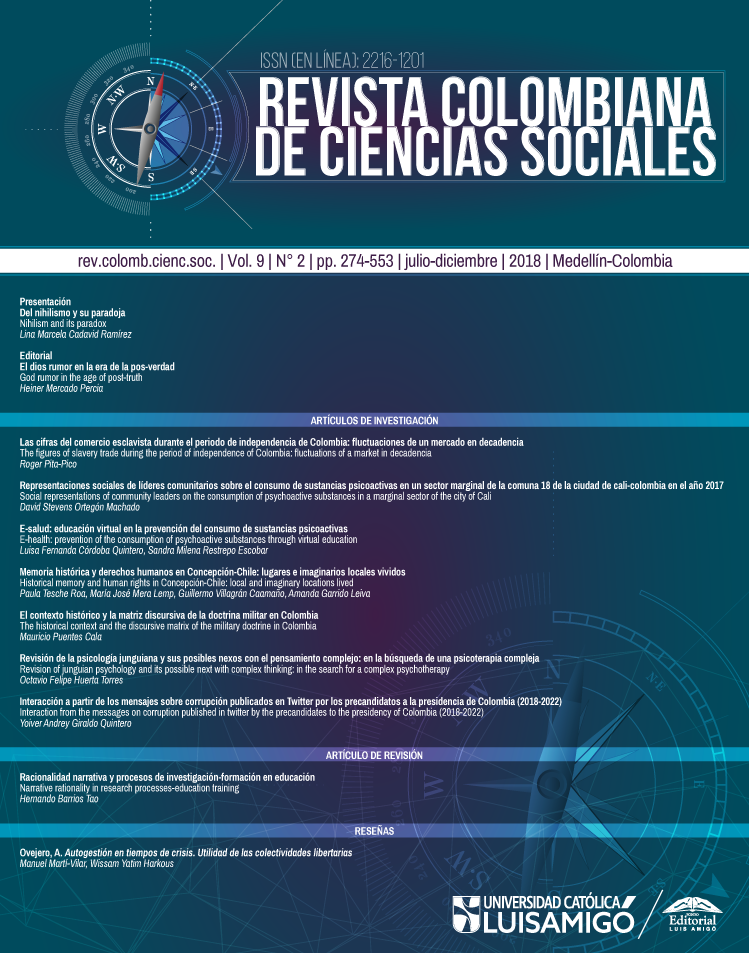GOD RUMOR IN THE AGE OF POST-TRUTH
DOI:
https://doi.org/10.21501/22161201.2837Abstract
In the Presentation of the previous edition it was realized, through the exhibition of some passages of Gadamer and Orwell, of a concern for the great power that the word has in itself and of the relationship between power and word in the field of research in the social sciences. In the quoted text of Gadamer, the German philosopher inquires about the word "authentic", whose ser-vice he is the maker of truth, not as adaequatío reí et intellectus, but as creator and founder of meaning. As Cadavid (2018) points out, the question about the authentic word "(...) no inquires about the problem of truth but about the possibility that the word has to be her same "(page 7). Consecutively, the allusion to Orwell aimed to highlight the need to return to the facts, since words can be used to hide reality. This back the facts is not a positivist call, but a means to highlight the phenomenon of post-truth.
Downloads
References
Aristóteles. (1994). Retórica (Q. Racionero, trad.). Madrid: Gredos.
Cadavid, L. (2018). Sobre la verdad de la palabra [Presentación]. Revista Colombiana de Ciencias Sociales, 9(1), 7-9. doi:10.21501/22161201.2605
Detienne, M. (1990). También el rumor es un dios. En M. Detienn, La escritura de Orfeo (pp. 111-119). Barcelona: Ediciones Península.
Drouin, M., Miller, D., Wehle, S., y Hernandez, E. (2016). Why do people lie online? “Because everyone lies on the internet. Computers in Human Behavior, 64, 134-142. doi: 10.1016/j.chb.2016.06.052
Gelfert, A (2018). Fake News: A Definition. Informal Logic, 38(1), 84-117. doi: 10.22329/il.v38i1.5068
Lakoff, G. (2017). No pienses en un elefante. Bogotá: Península.
Oxford University Press. (2016). Oxford Dictionaries. Recuperado de https://en.oxforddictionaries.com/definition/post-truth
Plutarco (1995). Obras morales y de costumbres.Moralia (R. Aguilar, trad.). Madrid: Gredos.
Post-truth politics. Art of the lie. (10 de septiembre de 2016). The Economist. Recuperado de https://www.economist.com/leaders/2016/09/10/art-of-the-lie
Ramírez Prado, J. (4 de octubre de 2016). El No ha sido la campaña más barata y más efectiva de la historia. La República, pp. 16-17. Recuperado de https://www.asuntoslegales.com.co/actualidad/el-no-ha-sido-la-campana-mas-barata-y-mas-efectiva-de-la-historia-2427891
Real Academia Española. (2018). Posverdad. En Diccionario de la lengua española. Recuperado de http://dle.rae.es/?id=TqpLe0m
Teofrasto. (1988). Caracteres (E. García, trad.). Madrid: Gredos.
Downloads
Published
How to Cite
Issue
Section
License
Copyright (c) 2018 Revista Colombiana de Ciencias Sociales

This work is licensed under a Creative Commons Attribution-NonCommercial-NoDerivatives 4.0 International License.
La revista y los textos individuales que en esta se divulgan están protegidos por las leyes de copyright y por los términos y condiciones de la Licencia Creative Commons Atribución-No Comercial-Sin Derivar 4.0 Internacional.











